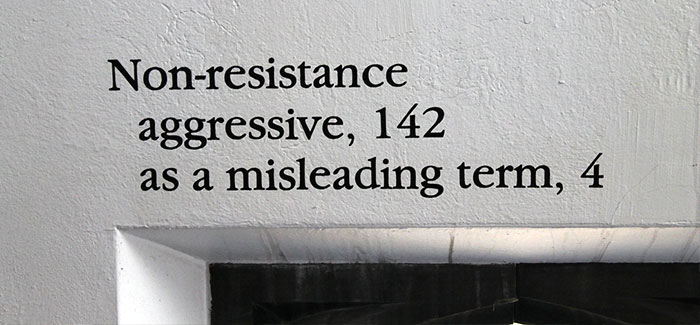
Inside Classics Hall. (Photography by Connie Ma, CC BY-SA 2.0)
Commentariat culture
Shut down the blog? Not necessarily.
On March 7 the somber rubbings from European tombs in Classics 110 looked down at 25 people picking at their lunches while they listened to David Nirenberg, professor of medieval history and social thought (and founding director of the Neubauer Collegium), discuss how scholars should write for nonacademic audiences. The talk was part of the Jewish Studies Workshop, attended largely by graduate students.
Some of the subjects Nirenberg addressed included comparing metaphor to technical language, explaining the humanities to a nonacademic audience, and writing a critical but effective book review. One topic that came up more than once was the role of the Internet in making a living as a humanities scholar. Is it a distraction or a necessary evil? History professor Walter Kaegi, who attended the workshop, raised economics professor Gary Becker’s (AM’53, PhD’55) argument that, “Nobody should blog until they have tenure. It’s professionally a waste of time. Make sure you spend the best years of your life, early, getting some major scholarship out.”
“I think that’s wise advice,” Nirenberg said. “On the other hand, when I look at the students in social thought at the literary magazine the Point, what they’ve done with it, it hasn’t delayed or lessened the quality of anyone’s dissertation. It has changed the way in which they think about their scholarly activity, teaching activity, and the place of the scholar in the world, so I think that’s a good thing. We all have to have to balance teaching and research and evaluation and commenting on other people’s work.”
On the topic of commenting, one attendee asked Nirenberg about how he evaluates the feedback he receives on his publications. Notwithstanding the occasional thoughtful letters or series of poems he has received from a Holocaust survivor who is a dedicated reader, overall, his stance on Internet comments on nonacademic publications? “Those are awful. When you read those, you realize how incidental your text was to whatever’s being pursued in those comments, how much hate and anger there is. I think a dissertation should be written on the comparative cultures of commenting. If you read the comments from various publications, they’re all very distinct cultures and something of a community is created. There’s something very interesting about that.”
